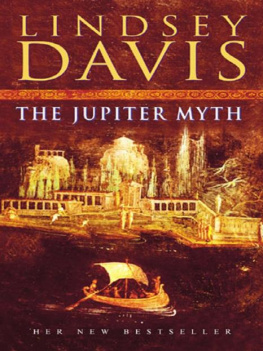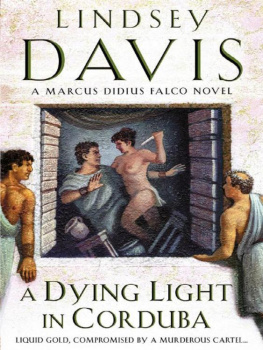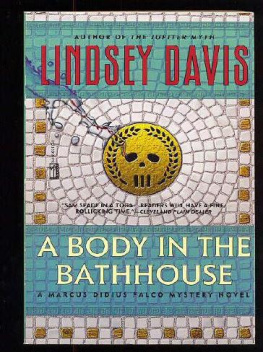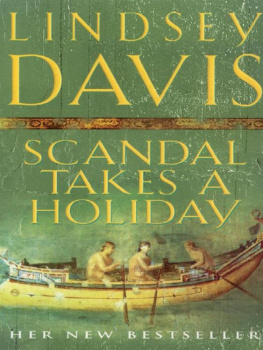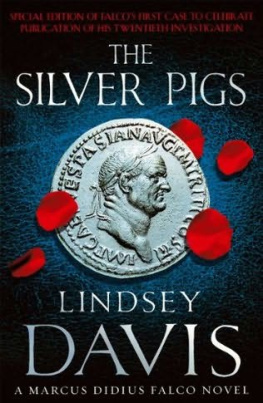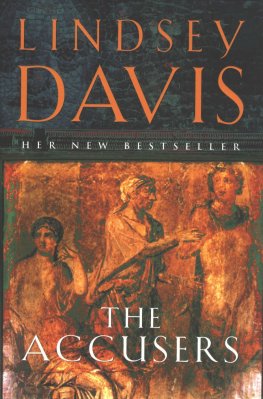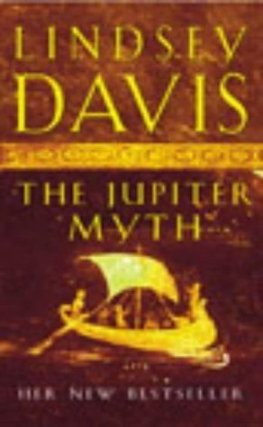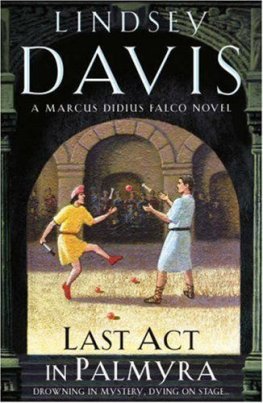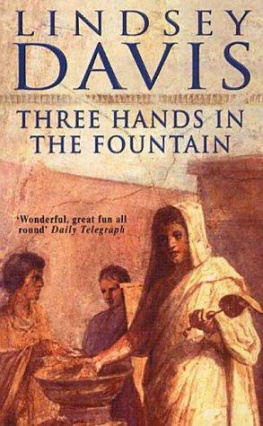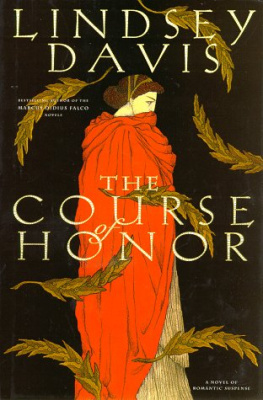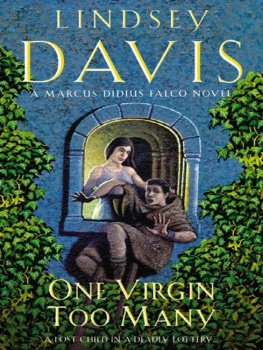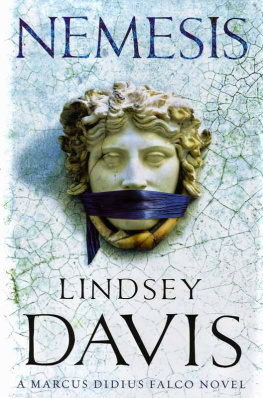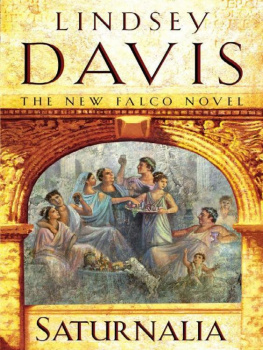Lindsey Davis - The Jupiter Myth
Here you can read online Lindsey Davis - The Jupiter Myth full text of the book (entire story) in english for free. Download pdf and epub, get meaning, cover and reviews about this ebook. year: 2004, publisher: Grand Central Publishing, genre: Detective and thriller. Description of the work, (preface) as well as reviews are available. Best literature library LitArk.com created for fans of good reading and offers a wide selection of genres:
Romance novel
Science fiction
Adventure
Detective
Science
History
Home and family
Prose
Art
Politics
Computer
Non-fiction
Religion
Business
Children
Humor
Choose a favorite category and find really read worthwhile books. Enjoy immersion in the world of imagination, feel the emotions of the characters or learn something new for yourself, make an fascinating discovery.
- Book:The Jupiter Myth
- Author:
- Publisher:Grand Central Publishing
- Genre:
- Year:2004
- Rating:5 / 5
- Favourites:Add to favourites
- Your mark:
- 100
- 1
- 2
- 3
- 4
- 5
The Jupiter Myth: summary, description and annotation
We offer to read an annotation, description, summary or preface (depends on what the author of the book "The Jupiter Myth" wrote himself). If you haven't found the necessary information about the book — write in the comments, we will try to find it.
The Jupiter Myth — read online for free the complete book (whole text) full work
Below is the text of the book, divided by pages. System saving the place of the last page read, allows you to conveniently read the book "The Jupiter Myth" online for free, without having to search again every time where you left off. Put a bookmark, and you can go to the page where you finished reading at any time.
Font size:
Interval:
Bookmark:
To Ginny, Who deserves it.
Now look here; you had better not expect half a page of sentimental guff. If you are a treasure and an inspiration and a dear friend who has suffered a year of stress, I shall certainly not say so. This is a British dedication, after all!
PRINCIPAL CHARACTERS
M. Didius Falco - an auditor on holiday
Helena Justina - companion of his life and heart; poor girl
Maia Favonia - Falco's sister; a widow (heading for trouble)
L. Petronius Longus - a vigiles officer (aiming for Maia)
S. Julius Frontinus - governor of Britain (thinks he runs the province)
G. Flavius Hilaris - procurator of finance (really does run it)
Aelia Camilla - Helena's aunt, his wife (runs Flavius Hilaris)
King Togidubnus - a Roman ally with a mind of his own
Verovolcus - past tense; a British mugging victim
Flavia Fronta - a 'respectable' barmaid, allegedly
Crixus - a disrespectful centurion, who knows it all
Silvanus - another centurion, who should know better
Norbanus Murena - a 'charming' property developer; perhaps a suspect
Popillius - an 'honest' lawyer; definitely suspect
Amazonia - a fighter with a future aka Chloris; trouble from the past
The Collector' working at the office; a cowardly pimp
Epaphroditus - a brave baker; in really bad trouble
Albia - a troubled young survivor
Finnus - a sunbather, in the customs service
Amicus - the official torturer
Splice - a different kind of persuader
Pyro - a persuasive arsonist
Children - too numerous to mention, especially Julia, Favonia, Marius, Cloelia, Ancus, Rhea and Flavia
Dogs - ditto
Barkeepers, gladiators, crooks, soldiers, slaves and so forth
A bear
A tired bee
LONDINIUM, BRITANNIA
AUGUST, AD 75
I
'IT DEPENDS WHAT we mean by civilisation,' the procurator mused.
Staring at the corpse, I was in no mood to discuss philosophy. We were in Britain, where the rule of law was administered by the army. Justice operated in a rough and ready fashion so far away from Rome, but special circumstances meant this killing would be difficult to brush aside.
We had been called out by a centurion from the small local troop detachment. The military presence in Londinium was mainly to protect the governor, Julius Frontinus, and his deputy, the procurator Hilaris, but since the provinces are not manned by the vigiles, soldiers carry out basic community policing. So the centurion attended the death scene, where he became a worried man. On investigation, an apparently routine local slaying acquired 'developments'.
The centurion told us he had come to the bar, expecting just a normal drunken stabbing or battering. To find a drowned man head-first down a well was slightly unusual, exciting maybe. The 'well' was a deep hole in a corner of the bar's tiny back yard. Hilaris and I bent double and peered in. The hole was lined with the waterproof wooden staves of what must be a massive German wine container; water came nearly to the top. Hilaris had told me these imported barrels were taller than a man, and after being emptied of wine they were often re-used in this way.
When we arrived, of course, the body had already been removed. The centurion had pulled up the victim by his boots, planning to heave the cadaver into a corner until the local dung cart carried it off. He himself had intended to sit down with a free drink while he eyed up the attractions of the serving girl.
Her attractions were not up to much. Not by Aventine standards. It depends what we mean by attractive, as Hilaris might muse, if he were the type to comment on waitresses. Myself, I was that type, and immediately we entered the dim establishment I had noticed she was four feet high with a laughable leer and smelt like old bootliners. She was too stout, too ugly, and too slow on the uptake for me. But I'm from Rome. I have high standards. This was Britain, I reminded myself.
There was certainly no chance of anyone getting free drinks now Hilaris and I were here. We were official. I mean really official. One of us held a damned high rank. It wasn't me. I was just a new middle-class upstart. Anyone of taste and style would be able to sniff out my slum background instantly.
'I'll avoid the bar,' I joked quietly. 'If their water is full of dead men, their wine is bound to be tainted!'
'No, I'll not try a tasting,' agreed Hilaris, in a tactful undertone. 'We don't know what they may stuff in their amphorae.
The centurion stared at us, showing his contempt for our attempts at humour.
This event was even more inconvenient for me than it was for the soldier. All he had to worry about was whether to mention the awkward 'developments' on his report. I had to decide whether to tell Flavius Hilaris - my wife's Uncle Gaius - that I knew who the dead man was. Before that, I had to evaluate the chances that Hilaris himself had known the calked corpse.
Hilaris was the important one here. He was procurator of finance in Britain. To put it in perspective, I was a procurator myself, but my role - which involved theoretical oversight of the Sacred Geese of Juno - was one of a hundred thousand meaningless honours handed out by the Emperor when he owed someone a favour and was too mean to pay in cash. Vespasian reckoned my services had cost enough, so he settled up remaining debts with a joke. That was me: Marcus Didius Falco, the imperial clown. Whereas the estimable Gaius Flavius Hilaris, who had known Vespasian many years ago in the army, was now second only to the provincial governor. Since he did know Vespasian personally, then (as the governor would be aware) dear Gaius was the Emperor's eyes and ears, assessing how the new governor ran the province.
He did not need to assess me. He had done that five years ago when we first met. I think I came out well. I wanted to look good. That was even before I fell for his wife's elegant, clever, superior niece. Alone in the Empire, Hilaris had always thought Helena might end up with me. Anyway, he and his own wife had received me back now as a nephew by marriage as if it were natural and even a pleasure.
Hilaris looked a quiet, clerkish, slightly innocent fellow, but I wouldn't take him on at draughts - well, not unless I could play with my brother Festus' weighted dice. He was dealing with the situation in his usual way: curious, thorough, and unexpectedly assertive. 'Here's one Briton who has not acquired much benefit from Roman civilisation,' he had said on being shown the corpse. That was when he added drily, 'I suppose it depends what you mean by civilisation, though.'
'He took in water with his wine, you mean?' I grinned.
'Better not jest.' Hilaris was no prude and it was not a reproof.
He was a lean, neat man, still active and alert - yet greyer and more haggard than I had remembered him. He had always given a slight impression of ill health. His wife, Aelia Camilla, seemed little changed since my last visit, but Flavius Hilaris looked much older, and I felt glad I had brought my own wife and youngsters to see him while I could.
Trying not to show that I was watching him, I decided he did know the dead man at his feet. As a career diplomat, he would also be aware of why this death would cause us problems. But, so far, he was not mentioning his knowledge to me.
That was interesting.
II
'SORRY TO drag you out, sirs,' murmured the centurion. He must be wishing he had kept quiet. He was totting up how much additional documentation he had let himself in for, and had realised belatedly that his commander would give him all Hades for involving the civil powers.
'You did the right thing.' I had never seen Hilaris back off from trouble. Strange to think that this man had served in the army (Second Augusta, my own legion, twenty years before me). He was part of the Invasion force, too, at a time for pragmatic dealings with the locals. But three decades of civic bureaucracy had turned him into that rare high-flying wonder, a public servant who followed the rules. Even rarer, instead of stagnating uselessly out here, he had mastered the art of making the rules work. Hilaris was good. Everyone said so.
Next pageFont size:
Interval:
Bookmark:
Similar books «The Jupiter Myth»
Look at similar books to The Jupiter Myth. We have selected literature similar in name and meaning in the hope of providing readers with more options to find new, interesting, not yet read works.
Discussion, reviews of the book The Jupiter Myth and just readers' own opinions. Leave your comments, write what you think about the work, its meaning or the main characters. Specify what exactly you liked and what you didn't like, and why you think so.

